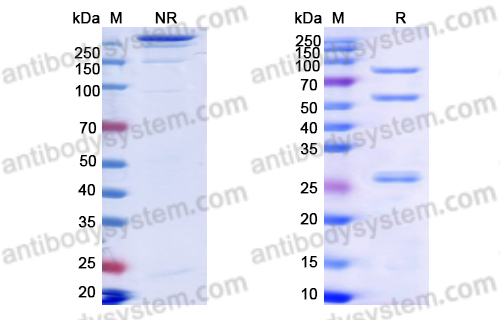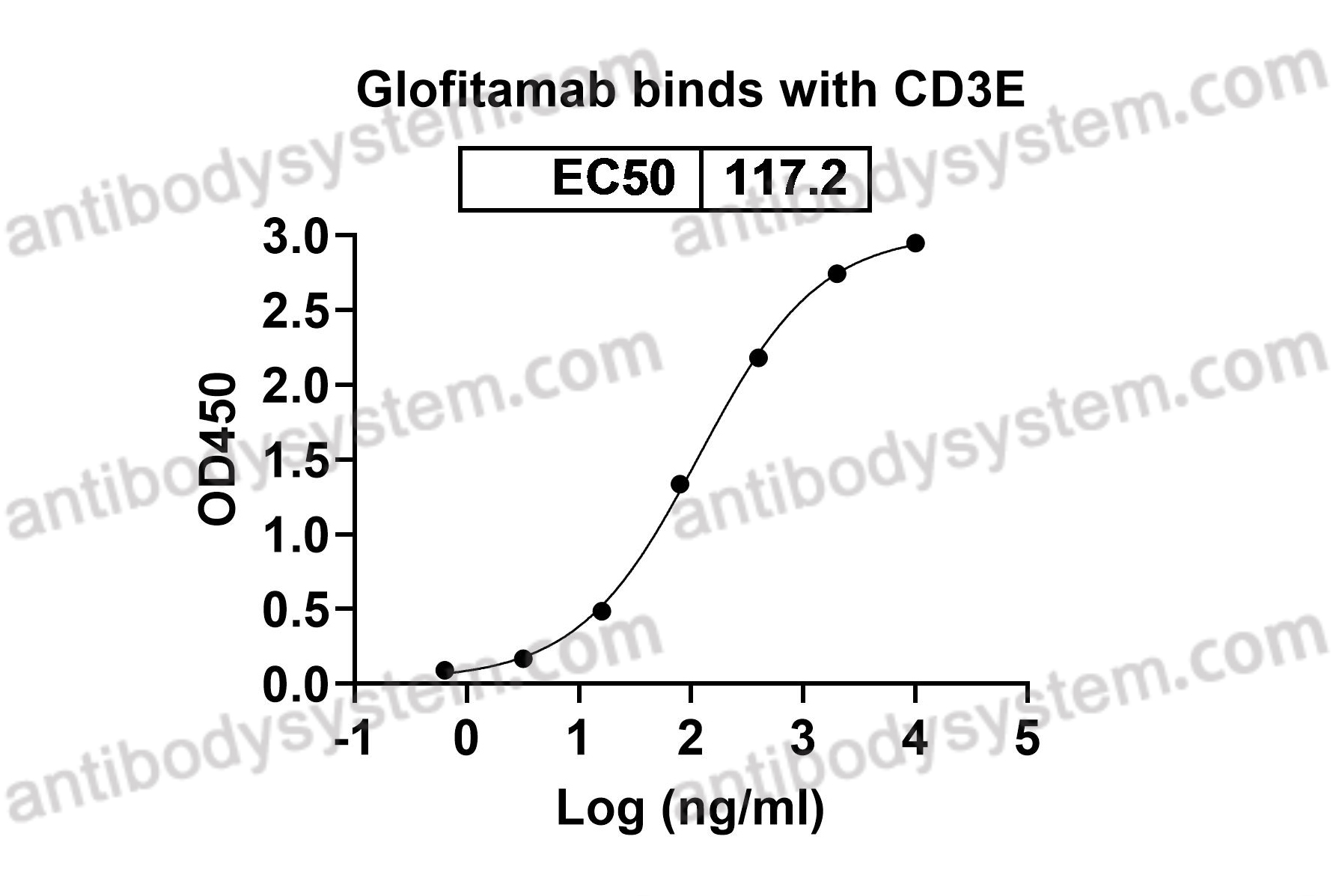Catalog No.
DHC90714
Description
Glofitamab is a T-cell-engaging bispecific antibody possessing a novel 2:1 structure with bivalency for CD20 on B cells and monovalency for CD3 on T cells. Glofitamab is an investigational, T-cell bispecific antibody with a distinctive design that features 2 Fab arms for binding CD20 on B cells, along with 1 Fab arm for binding CD3 on T cells. The CD3 binding arm is fused directly to one of the CD20-binding arms in a head-to-tail fashion via a short flexible linker.
Expression system
Mammalian Cells
Species reactivity
Human
Host species
Humanized
Isotype
IgG1-kappa-lambda
Clonality
Monoclonal
Target
B-lymphocyte surface antigen B1, Membrane-spanning 4-domains subfamily A member 1, MS4A1, Leukocyte surface antigen Leu-16, B-lymphocyte antigen CD20, Bp35, CD20, T3E, T-cell surface antigen T3/Leu-4 epsilon chain, CD3e, CD3E, T-cell surface glycoprotein CD3 epsilon chain
Concentration
1.06 mg/ml
Endotoxin level
Please contact with the lab for this information.
Purity
>95% as determined by SDS-PAGE.
Purification
Protein A/G purified from cell culture supernatant.
Accession
P11836 & P07766
Applications
Research Grade Biosimilar
Form
Liquid
Storage buffer
0.01M PBS, pH 7.4.
Stability and Storage
Use a manual defrost freezer and avoid repeated freeze-thaw cycles. Store at 4°C short term (1-2 weeks). Store at -20°C 12 months. Store at -80°C long term.
Alternative Names
Bispecific, CD20-TCB (2:1), RG-6026, CAS: 2229047-91-8
Clone ID
Glofitamab
Glofitamab CD20-TCB bispecific antibody, PMID: 34263696
Engaging results with glofitamab, PMID: 33828233
Cross-linking of T cell to B cell lymphoma by the T cell bispecific antibody CD20-TCB induces IFNγ/CXCL10-dependent peripheral T cell recruitment in humanized murine model, PMID: 33406104
Glofitamab, a Novel, Bivalent CD20-Targeting T-Cell-Engaging Bispecific Antibody, Induces Durable Complete Remissions in Relapsed or Refractory B-Cell Lymphoma: A Phase I Trial, PMID: 33739857
Bispecific antibodies for the treatment of lymphomas: Promises and challenges, PMID: 34105818
Efficacy and safety of Glofitamab in patients with R/R DLBCL in real life setting- a retrospective study., PMID:40512187
From Molecular Precision to Clinical Practice: A Comprehensive Review of Bispecific and Trispecific Antibodies in Hematologic Malignancies., PMID:40508128
QSP modeling of loncastuximab tesirine with T-cell-dependent bispecific antibodies guides dose-regimen strategy., PMID:40500294
CD20×CD3 Bispecific Antibodies in B-NHL: A Review of Translational Science, Pharmacokinetics, Pharmacodynamics, and Dose Strategy in Clinical Research., PMID:40471801
Pharmacological Insights on USFDA-Approved Novel Drug Therapies in the Year 2023., PMID:40464188
A Case Report of Sustained Cytokine Release Syndrome Due to Glofitamab and Literature Review., PMID:40322275
Recent development in bispecific antibody immunotherapy for hematological malignancies., PMID:40320222
Glofitamab with Polatuzumab Vedotin in Refractory Burkitt's Lymphoma., PMID:40305722
Cost-effectiveness analysis of glofitamab versus rituximab for relapsed or refractory diffuse large B-cell lymphoma patients in China., PMID:40293642
Successful treatment of primary refractory DLBCL/HGBL - MYC/BCL2 transformed from FL using glofitamab: a case report., PMID:40230856
Glofitamab results in cost savings versus epcoritamab in relapsed/refractory diffuse large B-cell lymphoma: a total cost of care analysis‡., PMID:40202060
Glofitamab in refractory or relapsed diffuse large B cell lymphoma after failing CAR-T cell therapy: a phase 2 LYSA study., PMID:40181090
Glofitamab induces deep and rapid response in relapsed primary central nervous system lymphoma., PMID:40174220
Budget impact of introducing glofitamab for treatment of relapsed or refractory diffuse large B-cell lymphoma after two or more lines of systemic therapy in the United States., PMID:40163049
Optimal Use of Bispecific Antibodies for the Treatment of Diffuse Large B-Cell Lymphoma in Canada., PMID:40136346
Enterocolitis associated with glofitamab-First report and clinicopathological findings in three cases., PMID:40108860
In vitro comparison of CD20xCD3 bispecific antibodies against diffuse large B-cell lymphoma (DLBCL) cell lines with different levels of expression of CD20., PMID:40032583
The Development and Application of Bispecific Antibodies in B-Cell Non-Hodgkin Lymphoma., PMID:39997328
Reply to: Glofitamab for the Treatment of Relapsed/Refractory Mantle Cell Lymphoma., PMID:39951674
Glofitamab for the Treatment of Relapsed/Refractory Mantle Cell Lymphoma., PMID:39951656
New bispecific antibodies in diffuse large B-cell lymphoma., PMID:39911111
The emergence of bispecific T-cell engagers in the treatment of follicular and large B-cell lymphomas., PMID:39820375
Salvage therapy for Burkitt lymphoma with glofitamab: a case report., PMID:39749407
Glofitamab in patients with HIV-associated B-cell lymphoma., PMID:39711495
Structural insight into CD20/CD3-bispecific antibodies by molecular modeling., PMID:39674067
Safety and Efficacy of Glofitamab for Relapsed/Refractory Large B-Cell Lymphoma in a Multinational Real-World Study., PMID:39661985
Bispecific antibodies for the treatment of hematologic malignancies: The magic is T-cell redirection., PMID:39617677
Benefit with glofitamab plus chemotherapy in transplant-ineligible R/R DLBCL., PMID:39609624
Dexamethasone is associated with reduced frequency and intensity of cytokine release syndrome compared with alternative corticosteroid regimens as premedication for glofitamab in patients with relapsed/refractory large B-cell lymphoma., PMID:39605203
Glofitamab plus gemcitabine and oxaliplatin (GemOx) versus rituximab-GemOx for relapsed or refractory diffuse large B-cell lymphoma (STARGLO): a global phase 3, randomised, open-label trial., PMID:39550172
Novel Bispecific T-Cell Engagers for the Treatment of Relapsed B Cell Non-Hodgkin Lymphomas: Current Knowledge and Treatment Considerations., PMID:39479221
The landscape of T-cell engagers for the treatment of follicular lymphoma., PMID:39398477
Glofitamab in Relapsed/Refractory Mantle Cell Lymphoma: Results From a Phase I/II Study., PMID:39365960
[Recent advances in the treatment of DLBCL]., PMID:39358300
Safety and Efficacy of Bispecific Antibodies in Adults with Large B-Cell Lymphomas: A Systematic Review of Clinical Trial Data., PMID:39273684
The Evolving Role of Bispecific Antibodies in Diffuse Large B-Cell Lymphoma., PMID:39063920
Tolerance of radiotherapy with concomitant glofitamab in diffuse large B cell lymphoma: a case report., PMID:38955824
Practice efficiency and total cost of care with bispecifics and CAR-T in relapsed/refractory diffuse large B-cell lymphoma: an institutional perspective., PMID:38913826
Glofitamab-Associated Immune Effector Cell-Associated Neurotoxicity Syndrome (ICANS) Presenting as Serial Seizures and Responding Positively to Antiseizure Drugs and Anakinra: A Case Report., PMID:38910651
[Glofitamab in relapsed and/or refractory diffuse large B cell lymphoma after at least two lines of treatment]., PMID:38876895
SOHO State of the Art Updates and Next Questions | Current Evidence and Future Directions for Bispecific Antibodies in Large B-Cell Lymphoma., PMID:38871556
Relapse after glofitamab, a novel unmet medical need with high rates of CD20 loss., PMID:38813657
Bispecific antibodies in the treatment of relapsed/refractory large B-cell lymphoma., PMID:38809821
Allogeneic transplantation after immunotherapy for relapsed/refractory non-Hodgkin lymphoma: a comparison with a historical cohort., PMID:38775776
[T-cell recruiting immunotherapies in B-cell lymphoma - the future backbone for all therapy lines?]., PMID:38749439
Predictive model for the risk of cytokine release syndrome with glofitamab treatment for diffuse large B-cell lymphoma., PMID:38743882
Relapse after glofitamab has a poor prognosis and rates of CD20 loss are high., PMID:38720530
Disrupting B and T-cell collaboration in autoimmune disease: T-cell engagers versus CAR T-cell therapy?, PMID:38642912


